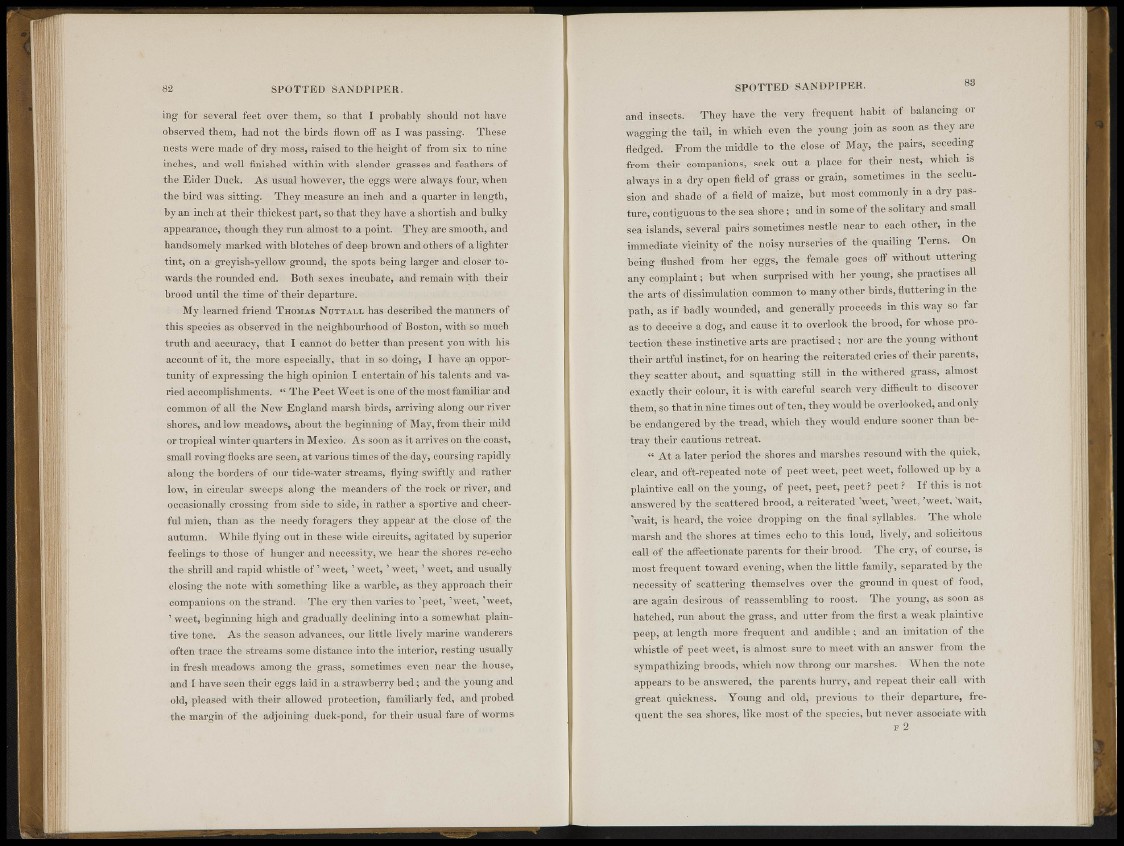
82 S P O T T E D SANDPIPER.
ing tor several feet over thorn, so that I probably should not have
observed them, had not the birds flown off as I was passing. These
nests were made of dry moss, raised to th;e height of from six to nine
inches, and well finished within with slender grasses amdjfeathers of
the Eider Duck. As usual however, the eggs were always four, when
the bird was sitting. They measure an inch and a quarter «(¡length,
by an inch at their thickest part, ho that they have a shortish and bulky
appearance, though they run almost to a point. They are smooth, and
handsomely niarked with blotches of deep brown and others of alightér
tint, on a; irreyish-yellow ground, the spots being larger and closer towards
the rounded end. Both sexes' ineubate, and remain with their
brood until the time of their departure.
My learned friend Thomas N'ht tau, has described the manners of
this specfes as observed in the neighbourhood of Boston, with' So much
truth and accuracy, that I cannot do better than present you with his
account of it,, tlio more especially, that in so doing, I have a® opportunity
of expressing the high opinion I entertain of Ms talents atnl varied
accomplishments, " The l'eot Wa i t is «mu of the most familiar and
conmion-ol' all; the New England marsh, birds, arriving along our river
shores, and low meadow.«, about the beginning of May, from their mild,
or tropical winter quarters in Mexico. Ah soon as i t arrives on the- const,
small roving flocks are seen, at various times of the day, coursing rapidly
along the borders of our tide-water streams, flying swiftly audi'rather
low, in circular sweeps along' :the meanders of this rock or river, and
occasionally crossing from side to side, in rathér aíspoftive and cheerful
mien, than as the needy foragers they appear at the close of the
autumn. While flying out in these wide circuits, agitated by superior
feelings to those of hunger and necessity, we hear the shores re-echo
• the shrill and rapi®íwhistle o f ' weet,- ' w e s t , ' weet, ' weet, and usually
closing the note with something like a warble, as tli'ey approach their
companions on the strand. The cry thwi varies to "poet,' weet, 'weet,
' weet, beginning high and gradually declining into a somewhat plaintive
tone. As the season advances, our little lively marine wanderers
often trace the streams some distance into the interior, resting usually
in fresh meadows among the grass, sometimos even near the house,
andil haveseen their eggs laid in a strawberry bed-; a¡nd the yóung and
old, pleased with their .allowed proteetisim, familiarly fed, and probed
the margin of the adjoining durife-fond, fop their usual fare of worms
S P O T T E D SANDPIPER. 83
a i d insects.' They have the very frequent habit of balancing or
wagging'the tail, in which even the young, join as soon as they are
fledged. Pro» the: middle to the close of May, the pairs, seceding
from" their companions; -sjsek out a place for -their nest, which is
always in a dry o f « field of grass or grain, sometimes in the: seclusion
and shade of a field of maize, but most commonly in a dry pasture,
contiguous to She' Sea shore; and in some of the solitary and small
sea islands, several pairs sometimes nestle near to each other, in the
immediate vicinity of the noisy nurseries of the quailing Terns. On
bem-M- flushed from her eggs, the female goes off without uttering
any^MpIaint; bur when surprise.! with her young, she practises all
tlm arts of dissimulation common to: many other birds, fluttering in the
path, as H badly wounded, and generally proceeds in this way so far
as to deceive, a dog, and cause it to overlook the brood, for whose protection
those instinctive arts are practised ; nor are the young without
their artful instinct, for on hearing the reiterated cries of their parents,
they scatter about, and squatting; still in the withered grass, almost
exactly their colour, it is with careful search very difficult to discover
them, so thatirfnine times out of ten, they would be overlooked, and only
be-endangered by tho tread, which they would .endure sooner than betray
their cautious retreat.
:« At .1 later period the shores and marshes resound with the quick,
clear, arid Oft-ropoated note of poet weet, peet weet, followed up by a
plaintive (-all on the young, of peet, peet, peet ? peet:? If this is not
answered by the scattered brood, a reiterated 'weet, 'weet, 'weet, 'wait,
'wait, is heard, the voice: dropping son the final syllables.' The whole
marsh and the shores at times echo to this loud, lively, and solicitous
call of the affectionate parents for their brood. The cry, of course, is
most frequent toward evening, when the little family, separated by the
necessity of scattering themselves over the ground in quest of food,
are again desirous reassembling to rosst. The young, as soon as
hatched, run about the grass, and utter from the first a weak plaintive
peep, at length more frequent and audible ; and an imitation of the
whistle of peet weet, is almost, sure to meet with an answer from the
sympathizing broods, which now throng our marshes. When the note
appears to b e answered, tho parents hurry, and repeat their call with
gieat quickie». Young and old, previous to their departure, frequent
the -Sea shores, like most of the species, but never associate with
v 2